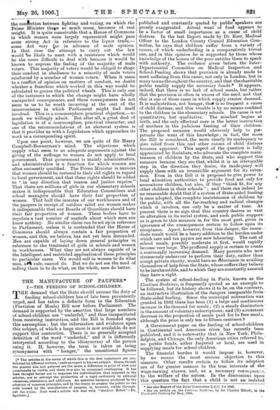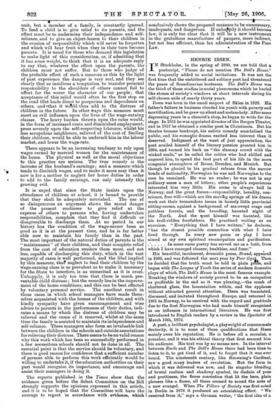demand that the State should assume the duty of feeding
school-children has of late been persistently urged, and has taken a definite form in the Education (Provision of Meals) Bill now before Parliament. The demand is supported by the assertion that large numbers of school-children are " underfed," and thus incapacitated from receiving instruction, and the Bill is founded upon this assumption ; but the information and evidence upon this subject, of which a large store is now available, do not support this contention. There is no generally accepted definition of the word "underfed," and it is differently interpreted according to the idiosyncrasy of the person using it. If, however, the term is taken as being synonymous with " hunger," the sensational figures [• The articles in the series of which this is the first instalment are con- tributed by different writers,—each an expert in his own subject. Hence, though the general aim and purpose are the same, a difference 111 point of view may occasionally be visible, and there may also be occasional overlapping. It has been thought better not to suppress the individualism thus apparent in the articles, nor to attempt the production of a rigid uniformity by editorial omissions, alterations, and additions. An essential harmony produced by the toloPtion of common principles, and by the desire to awaken the public to the evils caused by the manufacture of paupers, is, however, visible through. out the s :ries. 'Next week's article will deal with "Outdoor Relief."—En. ,Spectator.] published and constantly quoted by public speakers are grossly exaggerated. Actual want of food appears to be a factor of small importance as a cause of child distress. In the last Report made by Dr. Kerr, Medical Officer to the London County Council Education Com- mittee, he says that children suffer from a variety- of causes, of which underfeeding is a comparatively trivial one, and in this opinion he is supported by those whose knowledge of the homes of the poor entitles them to speak with authority. The evidence given before the Inter- Departmental Committee on Medical Inspection and School-Feeding shows that provision is already made to meet suffering from this cause, not only in London, but in. many towns throughout the country, and that the charitable, public readily supply the necessary funds.• It appears, indeed, that there is no lack of school meals, but rather that the provision is often in excess of the need, and that this is one of those cases in which supply creates demand. It is malnutrition, not hunger, that is so frequent a cause of child distress, and this trouble is by no means confined to the children in the elementary schools. Its cause is not quantitative, but qualitative. The mischief begins at birth, and the only effectual cure is the better instruction. of mothers in the judicious feeding of their children.. The proposed measure would obviously help to pea.- petuaae the want of this knowledge ; in fact, the more the Bill is considered, the more clearly its inadequacy to. give relief from this and other causes of child distress becomes apparent. This aspect of the question is fully. appreciated by Socialists, who advocate the complete main- tenance of children by the State, and who support this measure because they see that, whilst it is an irrevocable step in the direction they desire, its inadequacy will supply them with an irresistible argument for its exten- sion. Even in this Bill it is proposed to give power to local education authorities to provide food not only for necessitous children, but also, if they " think fit, for any other children in their schools " ; and there can indeed be no reasonable doubt that if a system of State-aided feeding is once adopted, the complete maintenance of children . by the public, with all the far-reaching and radical changes. which it involves, can only be a matter of time. At present there is no sign that this country desires so vast an alteration in its social system, and such public support, as is given to this measure is, for the most part, given in ignorance of the consequences certain to follow upon its. acceptance. Apart, however, from this danger, the imme- diate result would be a heavy addition to the burden under which rate and tax payers are now labouring. The cost of school meals, possibly moderate at first, would rapidly- become very large. The proffered supply is certain to create a. continually increasing demand. Many parents who now strenuously endeavour to perform their duty, rather than accept private charity, would have no Aluctance in availing themselves of help from the State, whose coffers they believe to be inexhaustible, and to which they are constantly assured they have a right.
The system of school-feeding in Paris, known as the Cantines Scolaires, is frequently quoted as an example to be followed, but its history shows it to be, on the contrary, an instructive illustration of the dangers inseparable from State-aided feeding. Since the municipal subvention was granted in 1882 there has been (1) a large and continuous increase in the demand for meals ; (2) a steady diminution in the amount of voluntary subscriptions; and (3) a constant decrease in the proportion of meals paid for to free meals, although the price is only ten to fifteen centimes.t A Government paper on the feeding of school-children in Continental and American cities has recently been published, and it is noteworthy that in New York, Phila- delphia, and Chicago, the only American cities referred to,' no public funds, either Imperial or local, are used in supplying meals for school-children.
The financial burden it would impose is, however, by no means the most serious objection to this measure. Other results certain to follow its adoption are of far greater menace to the true interests of the wage-earning classes, and, as a necessary consequenza; to the welfare of the nation. In the discussiona upon this question the fact that a child is not an isolated'
• See also Report of the Joint Committee L.C.C. for 1905.
t See an article on the Canting, Scula;re; by Sir Charles Elliott, in the Ntneteenth Century for hay, 1906. unity but a Member of a family, is constantly ignored. To feed a child is to give relief to its parents, and the effect must be to undermine their independence and self- reliance, and to give an object-lesson to their children in the evasion of responsibility which will never be forgotten and which will bear fruit when they in their turn become parents. It is usual for those who demand this legislation to make light of this consideration, or, if admitting that it has some weight, to think that it is an adequate reply to say that, whatever the effect upon the parents, the children must not suffer. But to those who judge of the probable effect of such a measure as this by the light of past experience the danger is very real, and they see clearly that so insidious a temptation to transfer personal responsibility to the shoulders of others cannot fail to affect for the worse the character of our people ; that acceptance of this relief would often be the first step on the road that leads direct to pauperism and dependence on others, and •that it would thus add to the distress of children in the future. In other *ays this measure must exert an evil influence upon the lives of the wage-earning classes. The heavy burden thrown upon the rates would, in the form of increased rents and diminished employment, press severely upon the self-respecting labourer, whilst his less scrupulous neighbours, relieved of the cost of feeding their children, would be able to undersell him in the labour market, and lower the wage-rate.
There appears to be an increasing tendency to rely upon wages earned by married women for the maintenance of the home. The physical as well as the moral objections to this practice are serious. The true remedy is the increase of the husband's earnings; and a measure which tends to diminish wages, and to make it more easy than it now is for a mother to neglect her home duties in order • to add to the family earnings, can only intensify this growing evil.
It is urged that since the State insists upon the attendance of children at school, it is bound to provide that they shall be adequately nourished. The use of so disingenuous an argument shows the moral danger of the present readiness to give relief at the expense of others to persons who, having undertaken responsibilities, complain that they find it difficult or disagreeable to discharge them. At no period in our history has the condition of the wage-earner been so good as it is at the present time, and he is far better able now to maintain his family than in the past. The most important of the natural duties of parents is the " maintenance " of their children, and their complete relief from the cost of education renders them more, and not less, capable of discharging this duty, which in the vast majority of cases is well performed, and the libel implied by this measure, that neglect to feed their children by the wage-earning class is so prevalent as to make it necessary for the State to interfere, is as unmerited as it is cruel. Unhappily, it is only too true that there is much pre- ventable child distress ; but the remedy lies in the improve- ment of the home conditions, and this can be best effected by voluntary personal service. The excellent result in those cases in which school managers have made them- selves acquainted with the homes of the children, and with kindly sympathy have given encouragement and wise advice to parents in the performance of their duties, indi- cates a means by which the distress of children may be relieved and the cause of it removed, whilst at the same time the family is assisted to maintain its independence and self-reliance. These managers also form an invaluable link between the children in the schools and outside associations for relieving their distress. There seems to be no valid reason why this work which has been so successfully performed in a few necessitous schools should not be done in all. The essential point is that the service should be voluntary, and there is good reason for confidence that a sufficient number of persons able to perform this work efficiently would be willing to undertake it, if the education authorities on their Part would recognise its importance, and encourage and assist their managers in doing it.
The reports published in the Times show that the evidence given before the Select Committee • on the Bill strongly supports the opinions expressed in this article, and it is to be hoped that the Committee will have the courage to report in accordance with evidence, which conclusively shows the proposed measure to be unnecessary, inadeqUate, and dangerous. If Unhappily it should become law, it is only too clear that it will be a new instrument in the gratuitous manufacture of paupers:more indirect, but not less efficient, than lax administration of the Poor Law. •











































 Previous page
Previous page